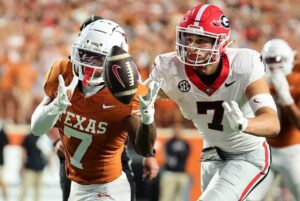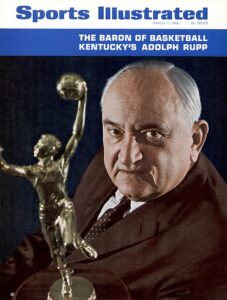
Arch Manning Faces the Weight of Legacy and Expectations as He Prepares for a Polarizing College Football Journey
Arch Manning isn’t just another talented quarterback entering the college football stage—he’s a name, a legacy, a story in motion before he’s even taken a meaningful snap as the face of the Texas Longhorns. But with that notoriety comes scrutiny. With that pedigree comes pressure. And with that spotlight comes something Manning may not be fully prepared for but will likely encounter soon enough: becoming the villain.
Fair or not, it happens. College football, with all its tribalism and tradition, has a long history of building stars up just to break them down. Arch Manning, grandson of Archie, nephew of Peyton and Eli, carries the kind of name that evokes immediate opinions. Those opinions won’t always be kind. And as he moves closer to taking the reins of the Texas offense, he should brace himself—he may soon be loved in Austin and loathed everywhere else.
It starts with the name. “Manning” in college football is royalty. That surname has meant excellence, poise, and professionalism for generations. But the same way it attracts admiration, it breeds resentment. Arch didn’t ask for the legacy, but he embodies it. Every throw he makes will be analyzed against a standard only a select few can understand. Every mistake will be magnified. Every win, expected. Every loss, scandalized.
At Texas, where football is religion and patience is fleeting, Manning will face pressure that even his uncles didn’t feel at Tennessee or Ole Miss. Peyton and Eli were celebrated for reviving programs. Arch is expected to restore greatness to a blue-blood school that hasn’t won a national title since 2005 and hasn’t been truly relevant for most of the past decade. His challenge is to live up to not only his name but also the desperate expectations of one of the most impassioned fanbases in America. That weight breaks players. If it doesn’t break Arch, it will forge him into something unforgettable—either a hero or a target.
College football needs villains. They drive narratives. They sharpen rivalries. And it’s not about bad behavior or arrogance. Often, it’s simply about being too good, too hyped, too successful. Think of Tim Tebow. Think of Johnny Manziel. Think of Baker Mayfield. Their careers were spectacular, but they all played under a microscope and often as the focal point of public vitriol. Manning may find himself in that same lane—not because he’s controversial or cocky, but because he represents the perfect storm of legacy, expectations, and potential dominance.
Manning’s recruitment only fueled that dynamic. When he committed to Texas over Alabama and Georgia, it was national news. The quarterback room instantly became a pressure cooker. Incumbents transferred. Questions swirled about whether Manning would sit, compete, or start. And in the NIL era, where branding and money are involved earlier than ever, his every move became a headline. It’s a new college football world, and Arch, ready or not, is at its center.
Some fans, particularly those outside of Austin, already view him with suspicion. They see a five-star with a famous last name and think: overrated. They see endorsements and media buzz and think: manufactured star. Whether fair or not, that’s the reality he’ll face. And if he starts winning big—especially in the SEC, where Texas is headed—it’ll only intensify. SEC fans don’t quietly watch legends unfold on opposing sidelines. They jeer, they troll, and they rally around their own. The Manning mystique won’t be welcomed in Baton Rouge, in Tuscaloosa, or in College Station. He’ll be booed. He’ll be mocked. And if Texas wins because of him, he’ll be hated.
But that hate? That’s power. The best college football players often become villains to someone. Reggie Bush heard boos in packed stadiums. Cam Newton was booed on every road trip and won a Heisman Trophy. Joe Burrow swaggered through the SEC and left broken records and broken defenses in his wake. They all wore black hats to rival fanbases—and gold crowns to their own. Arch Manning has the tools to follow that path. He’s got the arm, the IQ, the poise. What remains to be seen is whether he has the fire.
That fire may already be smoldering. Insiders in Austin describe Arch as fiercely competitive, someone who thrives in the details. He stayed silent while the world debated whether he should play immediately or redshirt. He kept working. He took the hits in practice, earned respect in the locker room, and slowly built trust among his coaches. That quiet grind, that refusal to engage in the circus, speaks volumes. The Mannings aren’t strangers to scrutiny, but Arch’s measured approach suggests he’s studied how to manage it.
He’ll need all of that composure. College football moves fast. One bad half can lead to trending topics on social media. One loss can have alumni questioning a coaching staff. At Texas, where boosters hold influence and fans expect playoff contention, the leash is even shorter. Manning will need to be strong mentally, not just physically. He’ll need to be steady through the storm, stoic when critics circle.
Because they will.
If Texas falters, blame will find him. If he throws a costly interception, it’ll be dissected on every ESPN panel. If he celebrates a big play too passionately, rival fans will call him arrogant. If he wins too much? They’ll root harder for his fall. That’s the paradox of college stardom: success breeds resentment. And Arch, knowingly or not, is walking straight into the heart of that fire.
What could help him navigate it is his family. Few players have access to the type of mentorship Arch Manning does. Peyton and Eli know the weight of expectation. Archie understands the pressure of carrying a team. They can provide more than support—they can provide perspective. That insight could be the difference between wilting under pressure or thriving within it. But even that support won’t change the noise. Arch must walk the walk himself.
There will be moments where his strength is tested—not by hits from linebackers, but by headlines, hashtags, and hostile crowds. There will be moments where he must answer with play, not words. And there will be moments when he must lean into the role thrust upon him. If he’s going to be the villain, then he may as well be the best one on the field.
The upside? If he embraces it, he could own his era of college football. Villains get remembered. They stir the passion. They dominate the highlight reels and become the main characters in the sport’s storylines. Arch Manning doesn’t have to be the darling of college football—he just has to be the difference-maker for Texas. If he does that, no amount of criticism or resentment will matter. He’ll be immortal in Austin.
So, as his moment draws nearer, Arch Manning stands at a unique crossroads. Loved for his potential, resented for his name, destined to be a central figure in college football’s next chapter. He’ll need to be strong, not just in the pocket but in his resolve. He’ll need thick skin and tunnel vision. He’ll need to handle the burden of being the most famous player in the sport without letting it consume him.
Because if he succeeds—and success at Texas means championships, not just bowl games—he won’t just be Arch Manning. He’ll be the Arch Manning. The one who lived up to the name. The one who brought Texas back. The one who wore the villain label with pride, turned the jeers into fuel, and left college football better—and louder—than he found it.





